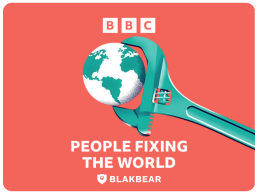BLAKBEAR IN THE SPOTLIGHT
Cutting Food Waste: Featured on BBC People Fixing the World Podcast
What if your food could tell you when it’s actually gone bad – and not just rely on a printed date? On the BBC World Service podcast People Fixing the World, reporter Craig Langran visited our lab in London and explored how our technology cuts food waste.

One simple mission. Food should tell you how fresh it is.
In the UK alone, we throw away an estimated 9.5 million tonnes of food every year, and 70% of that waste is still edible.
Supermarkets, food manufacturers and consumers are stuck using printed expiry dates (often conservative estimates) that don’t reflect the actual freshness of each pack. This results in unnecessary food waste.
“Either you will trust your nose or you’ll look at the date or maybe some combination of the two. But if you’re a business, if you’re a restaurant, a supermarket, a food manufacturing site, you don’t have that privilege. You don’t get to make that choice.” our CEO, Max Grell, explains. “[Store staff] have to pull it off the shelf, which often means wasted once it’s past the date.”
How BlakBear sensors work
Here’s how our sensors detect spoilage. They measure:
-
Spoilage gases like ammonia and putrescine – the same way your nose smells these gases.
-
Temperature changes inside the pack
This data feeds into our data models, which provides real-time freshness scores and predictive insights on shelf-life.
In the podcast, Craig Langran visits our lab and watches a real-time test of two identical chicken packs – same use-by date, same storage conditions – but radically different freshness levels. One smells fine. The other? Not so much.
“The difference is remarkable. Even though both of these packs have the same best before date and were stored under identical conditions, one smells fine while the other’s definitely off.” – Craig Langran
Why is there so much variation?
“There’s this huge variation between packs of food, even when they’re produced at the same time. Part of that could be temperature, but also there’s intrinsic variation in the product. There’s a different amount of bacteria in these slices of chicken when they are packed. And that variation, we have to safely encompass that with used by dates at the moment, which is so hard to get right, which is why they’re so risk-averse.” – CEO Max
How does BlakBear’s solution address this?
“Smart sensors sending real-time data about individual packs of food to the shops and the suppliers. So if one pack of chicken goes bad, they can pull it from the shelves without having to waste all the other packs.” – Craig Langran
Max explains with an extra day shelf life, especially on a short-life product such as chicken, strawberries or a sandwich, this can reduce waste by about a third.
Listen to the full podcast (we feature from 11m 25s!):
Schedule a demo
Let's shape the future of food quality and food waste.

